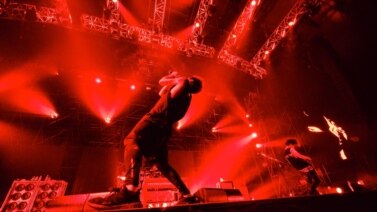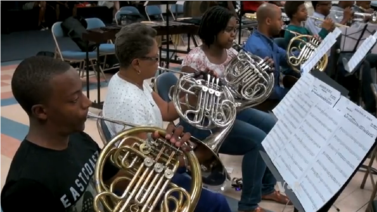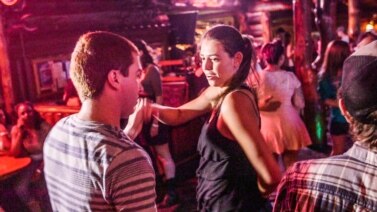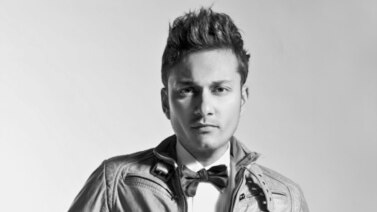When musicians over the age of 50 are the star performers, you expect to see many baby boomers cheering them on. Aging rock music stars usually have baby boomer fans. Younger rock stars are more likely to appeal to millennials, the generation born after 1980.
But that is not what happened at the Lockn' Music festival, which took place last month in rural Arrington, Virginia. Many Millennials joined Baby Boomers at the four-day event.
The Lockn’ Music festival itself seemed like a time capsule – with pieces of music from an earlier time. The performers were musicians like Robert Plant (Led Zeppelin), Carlos Santana, and members of the Grateful Dead.
Concert goer Robin Blomquist and other fans remember going to concerts like this back in the 1970s.
"I went to college in upstate New York and they played, you could go to a show every night and still make it to class the next day."
But this music also strikes a chord with a new generation of fans, like Jalen Michals Levy.
"My mother actually she raised me on rock 'n' roll."
Most Millennials were not even alive during the time when these musicians were famous. Young people come to events like this one, joining people who could be their parents or grandparents. Many wear tie-dye tops and denim -- popular clothing from the 1970s.
The worldwide web has countless videos of these musicians performing 40 or more years ago. Blogs and Facebook groups connect like-minded music communities. Older fans tell stories of the good old days. They hope to influence a new generation to experience concerts like these, and recapture the activist spirit of the '70s.
Another Millennial festival goer had this to say.
"The Baby Boom generation was really big on acting. Our generation, they think that sharing a post on Facebook or something is going to, I mean more people see it, it spreads awareness but it doesn't put any action. There's lots of potential in our generation, but no one's making moves to make it happen."
Pete Shapiro is one of the organizers of the Lockn’ Festival. He notes that Millennials, who are known for being tied to their smartphones, like to unplug just as much as Boomers do.
"In this day and age we all have these things (takes out smart phone). We spend a big part of our day like this. I think that people want an opportunity to put that away and be in the openness, be in the Blue Ridge Mountain range."
And what do these young Millennials make of these aging hippies?
"We've met a lot of like the original (Grateful) Dead Heads. It's pretty cool to hear all their old stories, and you know, hear what they've done. Times haven't changed that much really."
"A lot of these people I think were like, you know, at least I'd like to think in the front lines of social issues back in the '60s and the '70s, but as you get older you get more jaded. I'm very passionate about social justice and social issues, and sometimes it's hard to see that passion in the older generation but you know I think it's still there."
With music to bring them together, the generations might find a way to work together to re-start the movement that changed society nearly half a century ago.
I’m Marsha James.
Jacquelyn De Phillips reported on this story for VOANews.com. Marsha James adapted it for Learning English. George Grow was the editor.
Words in This Story
Baby Boomer – n. a person born between the end of World War and the early 1960s.
Millennial – n. a person reaching young adulthood around the year 2000
time capsule – n. a container that is filled with things from the present time and that is meant to be opened in the future
strike a chord – v. create an emotional reaction
unplug – v. to disconnect from something
hippies – n. a person who rejects established social customs and who opposes violence and war
jaded – adj. tired or lacking drive, energy



